Home
HOW LONG WILL KARADZIC'S TRIAL TAKE
According to earlier estimates, the Trial Chamber was to hand down its judgment to Radovan Karadzic by December 2012. The Trial Chamber’s latest calculation indicates that the judgment could be delivered sometime between August 2013 and April 2014. This was disclosed at a status conference, where the parties also discussed how to make sure the trial ‘doesn’t go out of hand’ and jeopardize its expeditiousness and fairness
 Radovan Karadzic in the courtroom
Radovan Karadzic in the courtroom The current pace of the trial of former Republika Srpska president Radovan Karadzic threatens to break all deadlines the United Nations Security Council has set for the closing down of the Tribunal in The Hague. Karadzic is on trial for genocide and other crimes perpetrated in the war in BH.
In their attempt to prevent the trial from ‘getting out of control, jeopardizing the expeditiousness and fairness’ – as Judge Kwon put it, the Trial Chamber has scheduled a status conference to deal with different options to speed up the process. Among other things, various options were probed from admitting evidence from the bar table, limiting time allotted to the accused for the cross-examination of prosecution witnesses and switch from a four-day to a five-day working week.
In that case, and provided that the prosecution cuts down on the time for its case as it has indicated it would, the trial could at best be completed in January 2013; the worst-case scenario is July 2013. The Trial Chamber could then deliver its judgment sometime between August 2013 and April 2014. Presiding judge Kwon emphasized that it was an ‘optimistic’ forecast.
The Karadzic trial started in late October 2009 with the opening statement of the prosecution, but the accused refused to attend the trial. The prosecution could not start its case before 13 April 2010. Only 19 of approximately 400 witnesses from the prosecution’s list have been examined so far. In the meantime, the judges have repeatedly warned the accused to use his time more efficiently. Statistics show that Karadzic has spent three and a half times as much time as the prosecution to cross-examine witnesses.
Karadzic today noted that his trial ‘suffers from lack of evidence’, asking what the purpose of the trial was at all – to achieve conviction at any cost or to establish the truth. If truth is the goal, then, Karadzic contends, it is necessary to ‘review all that has been erroneously established’ in the Tribunal’s judgments. ‘If all this were limited to my responsibility and my indictment, it would be a lot easier, but why then would the prosecution need so many adjudicated facts which set up a framework in which every Serb is guilty, and the president is the guiltiest’, Karadzic asked.
‘I am sure that not a single adjudicated fact indicates that all Serbs are guilty’, Judge Kwon replied, asking Karadzic to focus his defense on the prosecution charges against him.
Karadzic maintains that his trial is ‘important for history’, a ‘basis for future trials of civilian heads of states and armies’. As Karadzic put it, if ‘bad foundations are laid now, Serbs will not be the only ones to suffer damage, but their neighbors too who will still believe that Serbs are to blame for the Markale town market’.
‘This is a criminal trial and it is not our intention here to produce a white paper for history, or to correct history’, Judge Kwon retorted, suggesting once more to Karadzic to concentrate on the allegations in the indictment instead of history.
Linked Reports
- Case : Karadzic
- 2010-08-20 MLADIC’S DIARIES ADMITTED INTO EVIDENCE
- 2010-08-19 KARADZIC: SARAJEVO INVESTIGATIONS WERE ‘IMPROVISED AND SLOPPY’
- 2010-08-18 WITNESS FORGOT DETAILS
- 2010-09-06 KARADZIC: ‘IS SARAJEVO STILL WHERE IT ONCE WAS?’
- 2010-09-13 RADOVAN KARADZIC TRIAL ADJOURNED AGAIN
- 2010-09-14 HOSPITAL CALLED ‘SWISS CHEESE’
